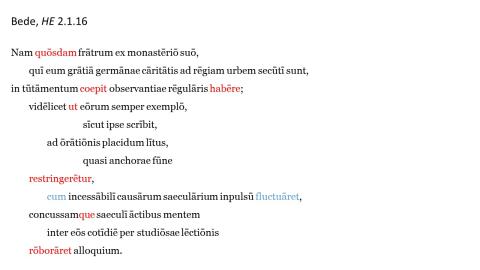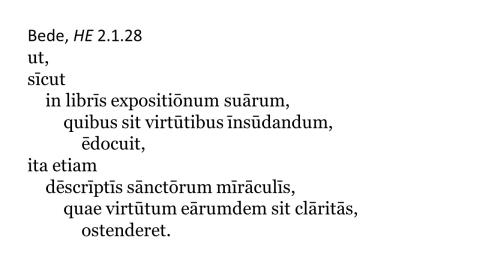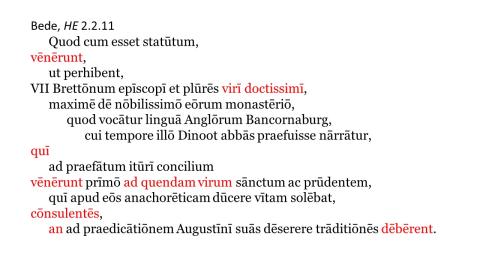<Dē obitū beātī Pāpae Gregōriī.>
[1] Hīs temporibus, id est annō dominicae incarnātiōnis DCV, beātus pāpa Gregōrius, postquam sēdem Rōmānae et apostolicae ecclēsiae XIII annōs mēnsēs sex et diēs decem glōriōsissimē rēxit, dēfūnctus est, atque ad aeternam rēgnī caelestis sēdem trānslātus. [2] Dē quō nōs convenit, quia nostram, id est Anglōrum, gentem dē potestāte Satānae ad fidem Chrīstī suā industriā convertit, lātiōrem in nostrā historiā ecclēsiasticā facere sermōnem. [3] Quem rēctē nostrum appellāre possumus et dēbēmus apostolum, quia, cum prīmum in tōtō orbe gereret pontificātum, et conversīs iam dūdum ad fidem vēritātis esset praelātus ecclēsiīs, nostram gentem eātenus īdōlīs mancipātam Chrīstī fēcit ecclēsiam, ita ut apostolicum illum dē eō liceat nōbīs prōferre sermōnem quia, etsī aliīs nōn est apostolus, sed tamen nōbīs est; nam signāculum apostolātūs eius nōs sumus in Dominō.
[4] Erat autem nātiōne Rōmānus, ā patre Gordiānō, genus ā proavīs nōn sōlum nōbile sed et religiōsum dūcēns. [5] Dēnique Fēlīx eiusdem apostolicae sēdis quondam episcopus, vir magnae glōriae in Chrīstō et ecclēsiā, eius fuit atavus. [6] Sed ipse nōbilitātem religiōnis nōn minōre quam parentēs et cognātī virtūte dēvōtiōnis exercuit. [7] Nōbilitātem vērō illam, quam ad saeculum vidēbātur habēre, tōtam ad nancīscendam supernae glōriam dignitātis dīvīnā grātiā largiente convertit. [8] Nam mūtātō repente habitū saeculārī monastērium petiit, in quō tantā perfectiōnis grātiā coepit conversārī ut, sīcut ipse posteā flendō solēbat adtestārī, animō illīus lābentia cūncta subteressent, ut rēbus omnibus quae volvuntur ēminēret, ut nūlla nisi caelestia cōgitāre solēret, ut etiam retentus corpore ipsa iam carnis claustra contemplātiōne trānsīret, ut mortem quoque, quae paene cūnctīs poena est, vidēlicet ut ingressum vītae et labōris suī praemium amāret. [9] Haec autem ipse dē sē nōn profectum iactandō virtūtum sed dēflendō potius dēfectum, quem sibi per cūram pāstōrālem incurrisse vidēbātur, referre cōnsuerat. [10] Dēnique tempore quōdam sēcrētō cum diāconō suō Petrō conloquēns, ēnumerātīs animī suī virtūtibus prīscīs mox dolendō subiūnxit: [11] ‘At nunc ex occāsiōne cūrae pāstōrālis saeculārium hominum negōtia patitur, et post tam pulchram quiētis suae speciem terrēnī āctūs pulvere foedātur. [12] Cumque sē prō condēscēnsiōne multōrum ad exteriōra sparserit, etiam cum interiōra appetit, ad haec procul dubiō minor redit. [13] Perpendō itaque quid tolerō, perpendō quid āmīsī dumque intueor illud quod perdidī, fit hoc gravius quod portō.’
[15] Haec quidem sānctus vir ex magnae humilitātis intentiōne dīcēbat; sed nōs crēdere decet nihil eum monachicae perfectiōnis perdidisse occāsiōne cūrae pāstōrālis, immō potiōrem tunc sūmsisse prōfectum dē labōre conversiōnis multōrum quam dē propriae quondam quiētē conversātiōnis habuerat; maximē quia et pontificālī fūnctus officiō domum suam monastērium facere cūrāvit; et dum prīmō dē monastēriō abstractus ad ministerium altāris ōrdinātus atque Cōnstantīnopolim apocrisiārius ab apostolicā sēde dīrēctus est, nōn tamen in terrēnō conversātus palātiō prōpositum vītae caelestis intermīsit. [16] Nam quōsdam frātrum ex monastēriō suō, quī eum grātiā germānae cāritātis ad rēgiam urbem secūtī sunt, in tūtāmentum coepit observantiae rēgulāris habēre; vidēlicet ut eōrum semper exemplō, sīcut ipse scrībit, ad ōrātiōnis placidum lītus quasi anchorae fūne restringerētur, cum incessābilī causārum saeculārium impulsū fluctuāret, concussamque saeculī āctibus mentem inter eōs cotīdiē per studiōsae lēctiōnis rōborāret alloquium. [17] Hōrum ergō cōnsortiō nōn sōlum ā terrēnīs est mūnītus incursibus, vērum etiam ad caelestis exercitia vītae magis magisque succēnsus.
[18] Nam hortātī sunt eum ut librum beātī Iob magnīs involūtum obscūritātibus mysticā interpretātiōne discuteret; neque negāre potuit opus quod sibi frāternus amor multīs ūtile futūrum impōnēbat. [19] Sed eundem librum, quōmodo iuxtā litteram intellegendus, quāliter ad Chrīstī et ecclēsiae sacrāmenta referendus, quō sēnsū ūnīcuique fidēlium sit aptandus, per XXX et V librōs expositiōnis mīrandā ratiōne perdocuit. [20] Quod vidēlicet opus in rēgiā quidem urbe apocrisiārius inchoāvit, Rōmae autem iam pontifex factus explēvit. [21] Quī cum adhūc esset rēgiā in urbe positus, nāscentem ibi novam hēresim dē statū nostrae resurrēctiōnis cum ipsō, quō exorta est, initiō iuvante sē grātiā catholicae vēritātis attrīvit. [22] Siquidem Eutycius eiusdem urbis episcopus dogmatīzābat corpus nostrum in illā resurrēctiōnis glōriā impalpābile, ventīs āereque subtīlius esse futūrum; quod ille audiēns et ratiōne vēritātis et exemplō dominicae resurrēctiōnis probāvit hoc dogma orthodoxae fideī omnimodīs esse contrārium. [23] Catholica etenim fidēs habet, quod corpus nostrum illā inmortālitātis glōriā sublīmātum subtīle quidem sit per effectum spīritālis potentiae, sed palpābile per vēritātem nātūrae, iuxtā exemplum dominicī corporis, dē quō ā mortuīs suscitātō dīcit ipse discipulīs: [24] ‘Palpāte et vidēte, quia spīritus carnem et ossa nōn habet, sīcut mē vidētis habēre.’ [25] In cuius assertiōne fideī venerābilis pater Gregōrius in tantum contrā nāscentem hēresim novam labōrāre contendit, tantā hanc īnstantiā, iuvante etiam piissimō imperātōre Tiberiō Cōnstantīnō, conminuit, ut nūllus exinde sit inventus, quī eius resuscitātor existeret.
[26] Alium quoque librum composuit ēgregium, quī vocātur Pāstōrālis, in quō manifēstā lūce patefēcit, quālēs ad ecclēsiae regimen adsūmī, quāliter ipsī rēctōrēs vīvere, quā discrētiōne singulās quāsque audientium īnstruere persōnās, et quantā cōnsīderātiōne propriam cotīdiē dēbeant fragilitātem pēnsāre. [27] Sed et Omēliās ēvangeliī numerō XL composuit, quās in duōbus cōdicibus aequā sorte distīnxit. [28] Librōs etiam Dialogōrum IIII fēcit, in quibus rogātū Petrī diāconī suī virtūtēs sānctōrum, quōs in Ītaliā clāriōrēs nōsse vel audīre poterat, ad exemplum vīvendī posterīs collēgit, ut, sīcut in librīs expositiōnum suārum, quibus sit virtūtibus īnsūdandum ēdocuit, ita etiam dēscrīptīs sānctōrum mīrāculīs quae virtūtum eārumdem sit clāritās ostenderet. [29] Prīmam quoque et ultimam Ezechiēlis prophētae partem, quae vidēbantur obscūriōrēs, per Omēliās XX et duās, quantum lūcis intus habeant, dēmōnstrāvit. [30] Exceptō libellō Respōnsiōnum, quem ad interrogātiōnēs sānctī Augustīnī prīmī Anglōrum gentis episcopī scrīpsit, ut et suprā docuimus, tōtum ipsum libellum hīs īnserentēs historiīs; libellō quoque Synodicō, quem cum episcopīs Ītaliae dē necessāriīs ecclēsiae causīs utillimum composuit, et familiāribus ad quōsdam litterīs. [31] Quod eō magis mīrum est tot eum ac tanta condere volūmina potuisse, quod omnī paene iuventūtis suae tempore, ut verbīs ipsīus loquar, crēbrīs vīscerum dolōribus cruciābātur, hōrīs mōmentīsque omnibus frāctā stomachī virtūte lassēscēbat, lentīs quidem, sed tamen continuīs febribus anhēlābat. [32] Vērum inter haec, dum sollicitus pēnsāret quia scrīptūrā teste: ‘Omnis fīlius, quī recipitur flagellātur,’ quō malīs praesentibus dūrius dēprimēbātur, eō dē aeternā certius praesumptiōne respīrābat.
[33] Haec quidem dē inmortālī eius sint dicta ingeniō, quod nec tantō corporis potuit dolōre restinguī. [34] Nam aliī quīdam pontificēs cōnstruendīs ōrnandīsque aurō vel argentō ecclēsiīs operam dabant, hīc autem tōtus ergā animārum lucra vacābat.
[35] Quicquid pecūniae habuerat, sēdulus hoc dispergere ac dare pauperibus cūrābat, ut iūstitia eius manēret in saeculum saeculī et cornu eius exaltārētur in glōriā; ita ut illud beātī Iob vērāciter dīcere posset: [36] ‘Auris audiēns beātificāvit mē, et oculus vidēns testimōnium reddēbat mihi, quod līberāssem pauperem vōciferantem et pūpillum cui nōn esset adiūtor. [37] Benedictiō peritūrī super mē veniēbat, et cor viduae cōnsōlātus sum. [38] Iūstitiā indūtus sum, et vestīvī mē sīcut vestīmentō et diadēmate iūdiciō meō. [39] Oculus fuī caecō et pēs claudō. [40] Pater eram pauperum, et causam quam nesciēbam dīligentissimē investīgābam. [41] Conterēbam molās inīquī, et dē dentibus illīus auferēbam praedam.’ [42] Et paulō post: ‘Sī negāvī,’ inquit, ‘quod volēbant pauperibus, et oculōs viduae exspectāre fēcī. [43] Sī comēdī bucellam meam sōlus, et nōn comēdit pūpillus ex eā. [44] Quia ab īnfantiā meā crēvit mēcum miserātiō, et dē uterō mātris meae ēgressa est mēcum.’
[45] Ad cuius pietātis et iūstitiae opus pertinet etiam hoc, quod nostram gentem per praedicātōrēs, quōs hūc dīrēxit, dē dentibus antīquī hostis ēripiēns aeternae lībertātis fēcit esse participem; cuius fideī et salūtī congaudēns, quamque dignā laude commendāns, ipse dīcit in Expositiōne beātī Iob: [46] ‘Ecce lingua Brittāniae, quae nīl aliud nōverat quam barbarum frendere, iam dūdum in dīvīnīs laudibus Hebrēum coepit allēlūia resonāre. [47] Ecce quondam tumidus, iam substrātus sānctōrum pedibus servit ōceanus, eiusque barbarōs mōtūs, quōs terrēnī prīncipēs ēdomāre ferrō nequīverant, hōs prō dīvīnā formīdine sacerdōtum ōra simplicibus verbīs ligant, et quī catervās pugnantium īnfidēlis nēquāquam metueret, iam nunc fidēlis humilium linguās timet. [48] Quia enim perceptīs caelestibus verbīs, clārēscentibus quoque mīrāculīs, virtūs eī dīvīnae cognitiōnis īnfunditur, eiusdem dīvīnitātis terrōre refrēnātur, ut prāvē agere metuat ac tōtīs dēsīderiīs ad aeternitātis grātiam venīre concupīscat.’ [49] Quibus verbīs beātus Gregōrius hoc quoque dēclārat, quia sānctus Augustīnus et sociī eius nōn sōlā praedicātiōne verbōrum sed etiam caelestium ostēnsiōne signōrum, gentem Anglōrum ad agnitiōnem vēritātis perdūcēbant.
[50] Fēcit inter alia beātus pāpā Gregōrius ut in ecclēsiīs sānctōrum apostolōrum Petrī et Paulī super corpora eōrum missae celebrārentur. [51] Sed et in ipsā missārum celebrātiōne tria verba maximae perfectiōnis plēna superadiēcit: [52] ‘Diēsque nostrōs in tuā pāce dispōnās, atque ab aeternā damnātiōne nōs ēripī et in ēlēctōrum tuōrum iubeās grege numerārī.’
[53] Rēxit autem ecclēsiam temporibus imperātōrum Mauricīī et Focatis. [54] Secundō autem eiusdem Focatis annō trānsiēns ex hāc vītā migrāvit ad vēram, quae in caelīs est, vītam. [55] Sepultus vērō est corpore in ecclēsiā beātī Petrī apostolī, ante sēcrētārium, diē quārtō Īduum Mārtiārum, quandōque in ipsō cum cēterīs sānctae ecclēsiae pāstōribus resurrēctūrus in glōriā, scrīptumque in tumbā ipsīus epitaphium huiusmodī:
[56]
Suscipe, terra, tuō corpus dē corpore sūmptum,
Reddere quod valeās vīvificante Deō.
Spīritus astra petit, lētī nīl iūra nocēbunt,
Cui vītae alterius mors magis ipsa via est.
Pontificis summī hoc clauduntur membra sepulchrō, 5
Quī innumerīs semper vīvit ubīque bonīs.
Ēsuriem dapibus superāvit, frīgora veste,
Atque animās monitīs tēxit ab hoste sacrīs.
Implēbatque āctū, quicquid sermōne docēbat,
Esset ut exemplum, mystica verba loquēns. 10
Ad Chrīstum Anglōs convertit pietāte magistrā,
Adquīrēns fideī agmina gente novā.
Hic labor, hoc studium, haec tibi cūra, hoc pāstor agēbās,
Vt Dominō offerrēs plūrima lucra gregis.
Hīsque Deī cōnsul factus laetāre triumphīs, 15
Nam mercēdem operum iam sine fīne tenēs.
[57] Nec silentiō praetereunda opīnio, quae dē beātō Gregōriō trāditiōne maiōrum ad nōs usque perlāta est quā vidēlicet ex causā admonitus tam sēdulam ergā salūtem nostrae gentis cūram gesserit. [58] Dīcunt quia diē quādam, cum advenientibus nūper mercātōribus multa vēnālia in forum fuissent conlāta, multī ad emendum cōnflūxissent, et ipsum Gregōrium inter aliōs advēnisse, ac vīdisse inter alia puerōs vēnālēs positōs candidī corporis ac venustī vultūs, capillōrum quoque fōrmā ēgregiā. [59] Quōs cum aspiceret, interrogāvit, ut aiunt, dē quā regiōne vel terrā essent adlātī. [60] Dictumque est quia dē Brittāniā īnsulā, cuius incolae tālis essent aspectūs. [61] Rūrsus interrogāvit utrum īdem īnsulānī Chrīstiānī, an pāgānīs adhūc errōribus essent implicātī. [62] Dictum est quod essent pāgānī. [63] At ille, intimō ex corde longa trahēns suspīria, ‘Heu, prō dolor!’ inquit, ‘quod tam lūcidī vultūs hominēs tenebrārum auctor possidet, tantaque grātia frontispīciī mentem ab internā grātiā vacuam gestat!’ [64] Rūrsus ergō interrogāvit, quod esset vocābulum gentis illīus. [65] Respōnsum est quod Anglī vocārentur. [66] At ille: ‘Bene,’ inquit; ‘nam et angelicam habent faciem, et tālēs angelōrum in caelīs decet esse cohērēdēs. [67] Quod habet nōmen ipsa prōvincia, dē quā istī sunt allātī?’ [68] Respōnsum est, quod Dēīrī vocārentur īdem prōvinciālēs. [69] At ille: ‘Bene,’ inquit, ‘Dēīrī; dē īrā ērutī et ad misericordiam Chrīstī vocātī. [70] Rēx prōvinciae illīus quōmodo appellātur?’ [71] Respōnsum est quod Aelli dīcerētur. [72] At ille allūdēns ad nōmen ait: ‘Allēlūia, laudem Deī creātōris illīs in partibus oportet cantārī.’
[73] Accēdēnsque ad pontificem Rōmānae et apostolicae sēdis (nōndum enim erat ipse pontifex factus), rogāvit ut gentī Anglōrum in Brittāniam aliquōs verbī ministrōs, per quōs ad Chrīstum converterētur, mitteret; sē ipsum parātum esse in hoc opus Dominō cooperante perficiendum, sī tamen apostolicō pāpae hoc ut fieret placēret. [74] Quod dum perficere nōn posset quia, etsī pontifex concēdere illī quod petierat voluit, nōn tamen cīvēs Rōmānī, ut tam longē ab urbe sēcēderet, potuēre permittere, mox ut ipse pontificātūs officiō fūnctus est, perfēcit opus diū dēsīderātum, aliōs quidem praedicātōrēs mittēns, sed ipse praedicātiōnem ut fructificāret suīs exhortātiōnibus ac precibus adiuvāns. [75] Haec iuxtā opīniōnem, quam ab antīquīs accēpimus, historiae nostrae ecclēsiasticae īnserere oportūnum dūximus.



